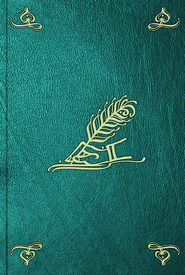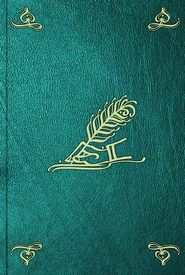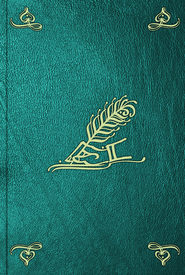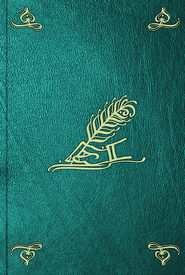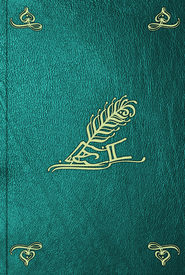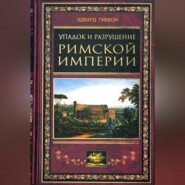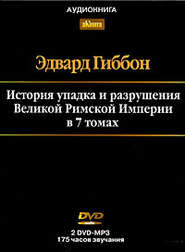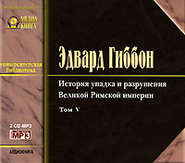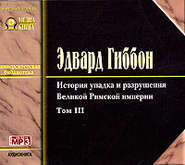По всем вопросам обращайтесь на: info@litportal.ru
(©) 2003-2025.
✖
Private Letters of Edward Gibbon (1753-1794) Volume 1 (of 2)
Настройки чтения
Размер шрифта
Высота строк
Поля
Dear Madam,
I am afraid (as dates are stubborn things) that I have been rather too lazy. As you love truth, and know me, I will not attempt an awkward apology, but shall only say, that I will endeavor such a delay shall not happen a second time. My father has more extensive priviledges, and indeed he seems to be very well acquainted with them.
FRIENDS IN PARIS
I still continue to like Paris, as well as I expected. You know that is saying a great deal. In two months I am acquainted with more, (and more agreable) people, than I knew in London in two years. Indeed the way of life is quite different. Much less play, more conversation, and instead of our immense routs, agreable societies where you know and are known by almost every body you meet. I have added several families to those I have already mentioned to you, and I find my conquests multiply every day. With regard to Mrs. M.'s son,[Footnote_43_43 - M. d'Augny.] I am glad to see that for once she has not exagerated; indeed she hardly could in speaking of him. We are now very intimate, & I think I begin to know his character. It is astonishing for a young French officer of the Guards. He is as reserved, as little a man of the world, and as awkward as I can be. But he has a fine natural understanding, improved upon almost every subject, a clear unprejudiced head, and a heart which seems to be full of the noblest sentiments of honor, probity and friendship. I will not decide too hastily, but I believe and hope that I am forming a connection which will last as long as my life. We see one another very often, and in most of my visits of curiosity he generally accompagnies me. These parties are of service to us both. I improve by the communication of his remarks, and he has occasion to see twenty places which he would perhaps not have seen for the too common reason, that they were in the place he had passed all his life in. The only unlucky circumstance is, that he has no women in his family. A Wife or a sister are, you know, most usefull and convenient things to bring friends together, whereas we are both single; he in his cousin's house, I in a lodging; and in this great town, are both obliged to get our living, which prevents our meeting so often as we could wish. Madame Bontems[Footnote_44_44 - Marie Jeanne de Chatillon, Madame Bontemps. Gibbon had met her son, who was acting as private secretary to the Duc de Nivernois in London, at Mallet's house in November, 1762. She translated Thomson's Seasons into French prose in 1759.] is a very good sort of a woman, agreable and sans pretensions. She seems to have conceived a real motherly attachment for me. I generally sup there three or four times a week quite in a friendly way.
I have nothing new to say of his Excellency. I have not seen him since my last letter, and but once in all. Not a single invitation either general or particular, and tho' I have made it a rule to leave my name at the door, at proper intervalls, I have never been lett in. The behavior is so very singular (especially with such a recommendation as mine) that I am sometimes tempted to think, some ill offices must have been done me. Not that I am conscious of any thing wrong or even imprudent in my behaviour. On the contrary, whenever I have heard the D.'s manner of living here blamed and laughed at, I have always thought it right to try to justify him, even against my own conscience. Indeed I am sorry, for the honor of my country to see how contemptible a figure he makes amongst our late enemies and constant rivals. My only comfort is that the National character is as much revered as his is despised. What Cromwell wished is now litterally the case. The name of Englishman inspires as great an idea at Paris as that of Roman could at Carthage, after the defeat of Hannibal. Indeed the French are almost excessive. From being very unjustly esteemed a set of pirates and Barbarians, we are now, by a more agreable injustice, looked upon as a nation of Philosophers and Patriots. I wish we would consider this opinion as an encouragement to deserve a character, which I am afraid we have not yet attained. I could add many things (some curious enough) with regard to the reigning politicks and publick affairs; but I have no occasion to say why it is much better to talk them over in your Dressing room some time hence. Perhaps I have even said too much already.
PARIS AND LONDON CONTRASTED.
With regard to Paris itself, I mean the houses and buildings, you know very well that their people of fashion are incomparably better lodged there than in London. Their vast Hotels, courts, stables, gardens, are very magnificent as well as convenient. A striking proof of the difference is the situation of our Embassador. He is full as well if not better lodged, in the Rue St. Dominique, than in Bloomsbury Square. However, his own house is reckoned one of the very best in London, and his hired one here is, both as to size, beauty and price, far inferior to a great many, even of that class, at Paris. Indeed I take the article of house rent to be much higher than in London, Did you ever hear of seven and eight hundred and even a thousand pounds a year being given for a house unfurnished. There are instances of it here. But as to the middling people, even those of fashion, I like a London house better. Without a regular porter to answer at the door, our little street-doors are more convenient. A fine large court is a very agreable thing, but a dark nasty gate-way is a very disagreable one. When you get up stairs you generally meet with two rooms. If we sat as much in our bed-chambers as they do, we have as many. They have indeed besides, an ante-chamber ill fitted up, and much littered, which the servants inhabit all day, except at noon and night that it serves for an eating parlour.
I have just seen here two families, the one my father's acquaintance, the other your's. The first was Mr. Prowse, who only passed thro' Paris, in his way for Tours, to which place he was going, with all his family, for his health. I dined with him at Mr. Foley's[Footnote_45_45 - The English banker at Paris.] & went about with him to several places the next day. In consequence of some little civilities of that kind, he asked me to dine with him the day after. He is a very agreable sensible man, but a strange being in France. The second is your good friend Mrs. Poyntz,[Footnote_46_46 - Mrs. Poyntz, wife of Stephen Poyntz, of Midgeham, Berkshire, was mother of Lady Spencer and grandmother of Georgiana, the beautiful Duchess of Devonshire.] whom I met by accident. She talked of you, whom she adores, asked me a hundred questions in a breath, told me all her own affairs, her tradesmen, her house-rent, her daughter, Lord Spencer, &c. &c. &c. &c. &c. &c., and insisted upon my calling upon her.
My love and duty to my father. I shall write to him next post and hope to hear from him sometimes. I have been obliged to draw for another hundred pounds. I do assure you I study the œconomical art.
I am, Dear Madam,
Most affectionately yours, E. G.
23.
To his Father
Paris, April the 5th, 1763.
Dear Sir,
I received your last letter with pleasure, because every thing that comes from you gives me pleasure; but I must own it afflicted me very much, as I see there are several things in which I have had the misfortune to displease either you or some other of my friends. I must endeavour to justify myself, and I think I can easily do it upon most of those heads.
Lord Litchfield[Footnote_47_47 - George Henry Lee (1718-1772), who succeeded his father as third Earl of Lichfield in 1743, was one of the leaders of the Jacobites. He came to court, however, on the accession of George III. "Lord Lichfield and several other Jacobites have kissed hands; George Selwyn says, 'They go to St. James's, because now there are so many Stuarts there'" (Walpole to Montagu, November 13, 1760). Lord Lichfield became in 1762 Chancellor of the University of Oxford, which may explain his reception of Gibbon's letter.] is angry at my writing to him. I am sorry for it and surprized at it at the same time. I could discover many reasons why he might not serve me, none that He could be angry at my application to him, especially as that application was made with all the decency and moderation, I could put into my letter. I should with pleasure have communicated it to you, and known your sentiments, but as we imagined here that the D. of B. would go away very soon, I was afraid that delay might destroy the very small hopes I had. Indeed I thought it the less necessary as I knew already your opinion both as to the eligibility of the thing, and the propriety of an application to the Noble Lord. I own the giving him no direction was not a happy specimen of my Secretarial acuracy.
As to my friends, Mallets, Worsleys,[Footnote_48_48 - Sir Thomas Worsley, Bart., Lieut. – Colonel of Gibbon's battalion of the Hampshire regiment, succeeded his father, Sir James Worsley, of Pilewell in Hampshire, and Appuldurcombe in the Isle of Wight. He married the eldest daughter of the Earl of Cork, by whom he had a son and a daughter. He continued a collection of notes on the Isle of Wight, commenced by his father and completed by his son, Sir Richard Worsley, the author of the History of the Isle of Wight (1781). He died September 23, 1768.] Portens, &c. &c. &c. &c., I must plead guilty, very guilty indeed to the indictment. I will not take up my time and yours in vain excuses, my best and only excuse ought to be and shall be, more exactness for the future. Notwithstanding Mrs. M.'s outrageousness she is the person I trouble my head the least about. However I propose writing to her to-night tho' with great repugnance and difficulty. I neither chuse to go to the Bastille for sending her observations upon the French government, nor to fill my letter full of romantick protestations of attachment and friendship, which I do not feel for her, and which she feels for nobody. As to La Motte I cannot forgive him his complaints, when I have so much juster ones to make of him. Follow his advice I most certainly did not, since he never would give me any, tho' I asked him several times in as intelligible terms as I could properly make use of. I was forced to have recourse to my other friends, to Madame Bontems, to M. d'Augney and to M. de Mirabeau,[Footnote_49_49 - The Marquis de Mirabeau (1715-1789), father of the famous orator and political leader, belonged to the school of Economists. In 1760 his Théorie de l'Impôt had lodged him in the Bastille, and made him the fashion in Paris. Gibbon speaks of him in his Journal (February 24, 1763): "Il a assez d'imagination pour dix autres, et pas assez de sens rassis pour lui seul." He met him at a supper-party in the house of Madame Bontemps.] and their directions have been very usefull to me. La Motte always shewed me such a dryness, such an unwillingness to connect himself at all with me, that I have been at last obliged to drop him almost entirely.
CONDUCT OF THE DUKE OF BEDFORD.
Do you think, dear Sir, that I would have stood upon the formality of a visit with the great Duke? Besides I had no occasion to do it. He returned mine the very next day. Since that time I have presented myself at his door once every week or ten days without being ever let in or hearing a syllable from him. What can I do more than sit down quiet and wonder at his behavior?
I have enquired into Mr. Thos. Bradley's affair. Mr. Taaffe is no longer at Mr. George Woolfe's. He is in a much safer place, in the Châtelet, a prison of Paris for debt. He has settled with his English Creditors and given up his estate at Jamaica for the payment of his debts. He wants to compromise with his other Creditors who are very numerous, (but as they are convinced he wants to cheat them and that he only offers the same estate after the other debts are cleared, which cannot be in less than ten or fifteen years) they will hear of no compromise. All that Mr. Bradley could do, would be to join with those Creditors in case they should at last agree to his proposals. Mr. Taaffe's scheme is to keep another estate at Jamaica clear of his creditors. They on their side want to starve him into giving up that likewise. If Mr. Bradley thinks it worth his while to push the affair, it will be attended with some trouble and expence. He must impower somebody at Paris to act in his name, and in order to do so a journey to London will be necessary where he must find out Mr. Benjamin Bobbin an Attorney beyond the Royal Exchange, who does all that kind of business, and who will draw up a letter of attorney in French for him, and get it certified by the French ambassador; a formality absolutely necessary to give it weight in this country. As to his Attorney at Paris, the necessary delays of the Law will render it proper to have a man who is established at * * *
I cannot therefore offer myself, (which I should otherwise do with great pleasure,) and I should hope Mr. Foley would be willing as he is certainly able to undertake it. I wish I could give Mr. Bradley a better account, but this seems to be the true state of the case.
My losses at Play have not been very considerable since I have been here, they amount to seven Livres lost one night at Picquet. It is indeed rather my good luck than my prudence that saves me. All my Societies are houses where I never see a card, so that I do not fall because I have no temptation. I find Paris however very expensive. One article which, tho' it encreases my draughts at present, will diminish them hereafter is cloathes, ruffles, silk stockings, &c., which after serious deliberation, I thought I had better make a provision of at this Capital of the Fashionable world. However as I begin to have pretty well seen Paris, I propose (if you have no objection) setting out about the eighth of next month, & going thro' Dijon and Besançon to Lausanne to pass two or three quiet and cheap months with my old friends there on my way to Italy. Adieu, Dear Sir, my paper fails me and I would avoid a cover.
I am, Dear Sir,
Yours most affectionately,
E. G.
24.
To his Stepmother
Besançon, May the 18th, 1763.
Dear Madam,
You will give me leave according to an article of our treaty, to write you only three lines, just to tell that I am well and where I am.
Upon my arrival at Besançon I saw Mr. Acton[Footnote_50_50 - Dr. Acton was a cousin of Gibbon. He married, "renounced his country, and settled at Besançon, and became the father of three sons, the eldest of whom, General (afterwards Sir John Francis Edward) Acton, is conspicuous in Europe as the principal minister of the King of the Two Sicilies." He was the grandfather of the present Lord Acton.] directly. He has received me with a degree not only of civility but of friendship which astonished me, insisted upon my taking an appartment in his house, and since my seeing him, himself and his three sons (our Southampton friend is one) have been only taken up in procuring me every kind of amusement, in carrying me to all my father's friends here who have all enquired much after him, in seeing publick places, and in parties at home and abroad. The only inconvenience is that I have not an instant to myself and that I am forced to write this scrawl at half an hour after one in the morning. The day after to-morrow I set out for Lausanne, where I shall be a little quieter. The Acton family desire to be remembered to my father.
I am, Dear Madam,
Yours and my father's with the truest affection,
E. G., Junior.
25.
To his Father
Lausanne, May the 31st, 1763.
Dear Sir,
BESANÇON.
I staid four or five days at Besançon longer than I intended, so that I got here only the 25th. It was even with some difficulty that I could disengage myself so soon from Mr. Acton's civilities. Indeed nothing could exceed them. Not only they insisted upon my lodging in the house, but during the time I passed in it, the sole business of the family seemed to be finding out amusements for me. They carried me to the best houses in the place, showed me whatever was worth seeing, and made several parties for me in the country. What I saw of Besançon pleased me so much, that, could I have stayed there without being an inconvenience to them, I should have liked to have stayed a few days or even weeks longer. Mr. Acton is the best sort of man in the world, and is bent on doing everything most agreable. He has a great deal of business, many friends and a very high reputation. He has indeed unluckily been too long out of England to remember his own language, and not long enough in France, to have learnt that of the country. He talked a vast deal of you, and tho' it is so long since you have been there, I have found your memory very fresh & many people who have enquired after you. The two sisters in particular of your écuyer (I have forgot their names) talked to me by the hour of their old friend Monsieur de Guibon. As to Acton's wife, you know the character Mrs. Darrel gives of her, and I was sorry to find it is pretty well established at Besançon; but she is certainly a very agreable and sensible woman, and I should have taken her for a very good-natured one. If she is a termagant I never saw such a Wolf in sheep's cloathing.
At last, Dear Sir, I am got to Lausanne and established very agreably among my old acquaintance, and in a way of life I like extremely, a moderate mixture of society and study. News from a place so very quiet and obscure you cannot expect. I have however seen an old friend of ours who has just left us; Sir Willoughby Aston.[Footnote_51_51 - Sir Willoughby Aston was returned M.P. for Nottingham in 1754, and was appointed Colonel of the Berkshire Militia in 1759. Lady Aston was a Miss Pye, of Farringdon, Berks. His "numerous" family consisted of his only son and successor, and of six daughters. He died August 24, 1772.] He had been here about a twelfmonth with Lady Aston and his numerous [family], and are just gone to Tours in France. Nobody could guess why. They lived very cheap here; Lady Aston had as many rubbers of Whist, and Sir Willoughby as many bottles of wine every day as they wanted. What could they have more? Sir Willoughby asked much after you, and was glad to see me to talk over Winchester camp and Reading court martial.
A propos of our militia, I have seen that of Switzerland. Their General review (of the Lausanne Battalion) was last Monday, Tuesday and Wednesday. I attended all three from beginning to end, and making all proper allowances saw them with great pleasure. They are only exercised twelve days in the year, and tho' many of them have been in foreign services, yet you know, Dear Sir, how very easy it is for a soldier to forget. They went through the manual, fired by divisions and platoons, formed the column, and square, a General discharge and charge: all very decently, and some (especially the Grenadiers) very prettily. I do not compare them to our militia. As we were embodied two or three years, the comparaison would be an affront.
LAUSANNE
I took credit from Mr. Foley upon a Lausanne banker, who is likewise a brother captain of Grenadiers. I have not made use of it yet, and when I do, it shall be as sparing as possible. I have got a few books together, and am busy upon the ancient Geography of Italy and the reviewing my Roman history and antiquities. If you have no objection to leaving me here till the spring, I should like it very much and think it might be of use to me. But I submit the thing entirely to you.
You will be so good, Dear Sir, as to present my sincerest love and duty to Mrs. Gibbon, and my most affectionate compliments to her brothers, and to believe me
Most truly yours,
E. Gibbon, Junior.
26.
To his Stepmother
Lausanne, June the 18th, 1763.
Dear Madam,
If my own laziness did not deprive me of any right to complain, I should say perhaps that it was a great while since I had heard either from you or my father. I have indeed the satisfaction of knowing my father was well the 26th of May, and I hope he is by this time one of the Honorable Verdurers of the forrest of Beer. Pray, a propos of English and county news, who is our Lord Lieutenant? I had the mortification of seeing in the paper that the Duke of Bolton was turned out (I mean had resigned) and that the Marquis of Caernarvon was appointed in his room. I hope it is not true.







